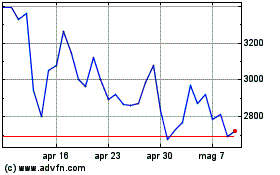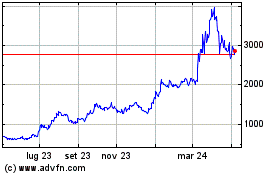The Importance of Safety When Using Self-Custody Platforms
28 Febbraio 2022 - 11:05AM
NEWSBTC
Safety is one of the most important topics of the crypto sphere,
and with good reason. Even the most significant self-custody
platforms, such as OpenSea, are vulnerable to malicious behavior
and attacks. Read on to find out why security should be your number
one priority, and learn from a recent, serious phishing attempt on
OpenSea. What does self-custody mean? Essentially, self-custody in
crypto refers to holders’ sole responsibility to handle and store
their information data such as private keys. Consequently, a
self-custody platform does not keep any kind of record of private
keys, and thus delegates the task of safeguarding them to key
owners. About the OpenSea phishing attack Phishing is a type of
malicious activity that manipulates the victim into sharing
confidential credentials or information, mostly by fake
communication. Phishing is a serious threat even today, and it’s
also one of the hardest attacks to discover, as it’s disguised as
ordinary messaging. To demonstrate how real this issue is, here’s
the recent case of OpenSea, one of the most important Non-Fungible
Token (NFT) marketplaces of its time. According to official
sources, the phishing attack influenced 32 platform users, who
actually suffered damages to their holdings because of the event.
The company’s CEO, David Finzer, highlighted that the attack is
likely not directly connected to OpenSea’s platform, and users
signed the malicious action elements somewhere else, which just
underlines the significance of keeping your sensitive data safe
when using a self-custody platform. Overall, while some rumors said
that the stolen value was somewhere in the $200M range, David
Finzer mentioned that the address, which they believe to be the
hacker’s, has $1.7M to its name, which is still an outstandingly
high figure. Why should safety be a priority? With the advancement
of technology came the progress of hacks as well, and so nowadays,
it’s more important than ever to take all the necessary precautions
that aim to prevent such events. This is especially true when using
self-custody platforms, since it’s the users’ responsibility to
safeguard their private information, including their private keys.
The reason why safety should come first is quite straightforward:
the more one accumulates, the better the target for hackers, and if
security is neglected, all those hard-earned funds can permanently
disappear, faster than one would think. Implications of safety
while trading Safety is also vital when it comes to trading
cryptocurrencies, be it on a centralized exchange (CEX), or a
decentralized exchange (DEX). Unfortunately, there are very few
platforms out there that actually put sufficient emphasis on the
topic. A great example of a DEX that ticks the box of high-level
security is FOMODex, which is a multichain automated market maker
(AMM), supporting Binance Smart Chain (BSC), Ethereum (ETH), and
Polygon (MATIC). The platform recognized that without proper safety
measures, everything else is basically useless, as results are only
as good as their protection. Therefore, its team reportedly created
FOMODex to be one of the most secure DEXs, despite its multichain
environment and high volume of transactions. To further emphasize
this, FOMODex launched as the first DEX that is regulated in the
U.S., which means users’ protection is elevated, and grounds are
provided for legal cases, should fraud occur. This is a remarkable
achievement, as U.S. regulators are notoriously hard to get
approval from. Final thoughts As demonstrated by both theory and
real-world events, safety is truly one of the most overlooked, yet
extremely vital aspects of dealing with cryptocurrencies. However,
with next-generation platforms and users recognizing its
importance, proper security will become the number one feature
users look for when choosing where to conduct business in the near
future.
Grafico Azioni Maker (COIN:MKRUSD)
Storico
Da Mar 2024 a Apr 2024

Grafico Azioni Maker (COIN:MKRUSD)
Storico
Da Apr 2023 a Apr 2024
